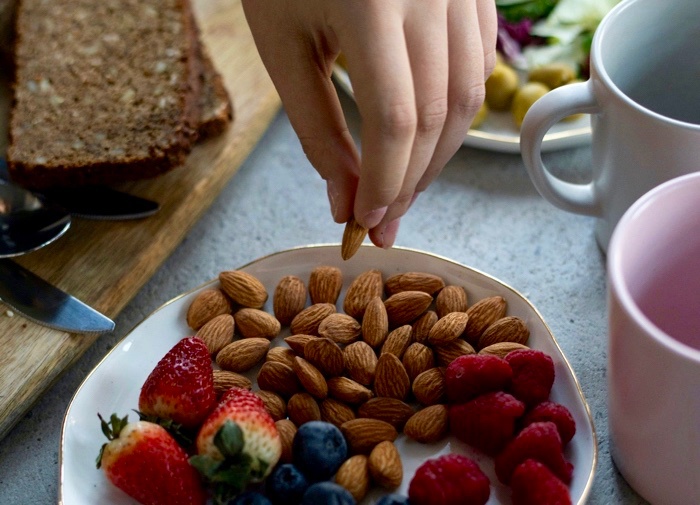
You know that what you eat affects your skin’s health, right? Your skin is the body’s largest organ and draws the nutrients it needs from the foods you eat.
That means consuming healthy foods and beverages is just as good for your skin as it is for the rest of the body—and vice versa. In fact, some studies have shown that eating unhealthy, fast-food and processed food items can result in accelerated aging of your skin!
Researchers wrote in a 2014 study, “Rhytides, sagging of skin, and loss of elasticity are all related to changes in the collagen and elastic fibers of the skin, which are themselves impacted by diet.”
From what we know about how diet impacts skin so far, we can suggest you add the following seven foods and beverages to your meals and snacks more often. They can all support healthy, strong skin that will be more resistant to fine lines, wrinkles, and sagging, and may just help you stay looking younger longer.
1. Almonds
These are rich in essential fatty acids that the skin needs to stay moisturized and plump. They’re also a great source of protein, which helps the body build collagen—the nutrient we need to avoid sagging and bagging.
In a small recent study, researchers found that a daily snack of almonds improved measures of wrinkle width and severity in postmenopausal women.
2. Green Tea
Green tea has healthy plant chemicals called “polyphenols” that can help reduce sun damage on the skin. Not only do these chemicals reduce the inflammation that can be caused by UV rays, but they can even protect DNA from damage, reducing the risk of skin cancers.
3. Turmeric
The popular Indian spice turmeric contains “curcumin,” a plant chemical that helps suppress inflammation and reduce oxidative stress. It’s also been found in studies to encourage wound healing, ease the symptoms of psoriasis, and help reduce the scaling and itching in patients with eczema.
(Note: All of our skincare products contain turmeric!)
4. Yogurt
Yogurt is a great source of probiotics, which help you maintain a healthy microbiome (balance of good and bad bacteria) in the gut. The skin has a microbiome too, though, which means any probiotics you eat will help maintain the skin’s natural bacterial balance as well.
Studies on probiotics in the skin have found that they can help preserve the health of the skin and boost the skin’s immune system, which can help reduce allergic and sensitive reactions. Yogurt is also a good source of protein (particularly if you choose Greek yogurt), which feeds the skin the building blocks of collagen.
5. Salmon
Like almonds, salmon and other fatty fish are high in essential fatty acids, which are the building blocks of healthy cell membranes and are critical for producing the skin’s natural oil barrier, and for keeping it hydrated and younger-looking.
Research has shown that higher intakes of these essential fatty acids are associated with less dryness and reduced “thinning” of skin, such as that which occurs with aging. Fatty acids like those in salmon also help protect from sun damage and inflammation.
6. Dark Chocolate
Who would have thought that chocolate could help delay the appearance of aging? But studies suggest it’s true. Dark chocolate is rich in antioxidants, and includes a unique plant chemical called “epicatechin.” This chemical can reduce damaging oxidating stress and inflammation, particularly when the skin is exposed to the sun.
In a 2016 study, researchers found that subjects who took a cacao supplement suffered from less skin damage when exposed to UV rays, and also experienced protection against UV-induced wrinkles and dark spots.
7. Avocados
Avocados are full of nutrients and healthy fats that are good for the skin. They have unique polyhydroxylated fatty alcohols (PFAs) that have been tested for their skin-protective properties. In a 2011 study, researchers found that these PFAs reduced UV-induced damage and inflammation in the skin, decreasing inflammation and enhancing DNA repair.
Avocados also contain powerful antioxidants lutein and zeaxanthin, which help reduce free-radical damage and protect DNA.
What foods work well for your skin?
Sources
“Daily Consumption of Almonds Reduce Facial Wrinkles, According to a New Study – Times of India.” The Times of India. Last modified October 11, 2019. https://timesofindia.indiatimes.com/life-style/health-fitness/diet/daily-consumption-of-almonds-reduce-facial-wrinkles-according-to-a-new-study/articleshow/71521331.cms.
Katta, Rajani. “Diet and Dermatology The Role of Dietary Intervention in Skin Disease.” J Clin Aesthet Dermatol 7, no. 7 (July 2014), 46–51. https://www.ncbi.nlm.nih.gov/pmc/articles/PMC4106357/.
Kim, Jong-Eun, Dasom Song, Junil Kim, Jina Choi, Jong R. Kim, Hyun-Sun Yoon, Jung-Soo Bae, et al. “Oral Supplementation with Cocoa Extract Reduces UVB-Induced Wrinkles in Hairless Mouse Skin.” Journal of Investigative Dermatology 136, no. 5 (2016), 1012-1021. doi:10.1016/j.jid.2015.11.032.
Laura, Vollono, Falconi Mattia, Gaziano Roberta, Iacovelli Federico, Dika Emi, Terracciano Chiara, Bianchi Luca, and Campione Elena. “Potential of Curcumin in Skin Disorders.” Nutrients 11, no. 9 (2019), 2169. doi:10.3390/nu11092169.
Rosenblat, Gennady, Shai Meretski, Joseph Segal, Mark Tarshis, Avi Schroeder, Alexandra Zanin-Zhorov, Gilead Lion, Arieh Ingber, and Malka Hochberg. “Erratum to: Polyhydroxylated fatty alcohols derived from avocado suppress inflammatory response and provide non-sunscreen protection against UV-induced damage in skin cells.” Archives of Dermatological Research 303, no. 4 (2011), 299-299. doi:10.1007/s00403-011-1139-7.

